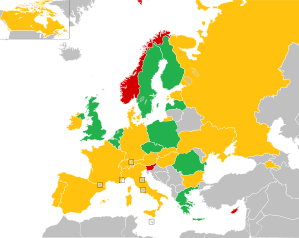Eurovision Young Dancers 2005
This article needs additional citations for verification. (April 2015) |
| Eurovision Young Dancers 2005 | |
|---|---|
 | |
| Dates | |
| Final | 24 June 2005 |
| Host | |
| Venue | National Theatre, Warsaw, Poland |
| Presenter(s) | Agata Konarska |
| Directed by | Jan Dworak |
| Executive producer | Barbara Trzeciak-Pietkiewicz |
| Host broadcaster | Telewizja Polska (TVP) |
| Website | youngdancers |
| Participants | |
| Number of entries | 13 |
| Debuting countries | None |
| Returning countries | None |
| Non-returning countries | |
| |
| Vote | |
| Voting system | A professional jury chose the finalists and gave points to each performance |
| Winning dancers | Milou Nuyens (classical dance) |
The Eurovision Young Dancers 2005 was the eleventh edition of the Eurovision Young Dancers, held at the National Theatre in Warsaw, Poland on 24 June 2005.[1] Organised by the European Broadcasting Union (EBU) and host broadcaster Telewizja Polska (TVP), dancers from ten countries participated in the televised final. A total of thirteen countries took part in the competition. For this contest, a week of dance master classes replaced the semi-final round in order to select the finalists. Armenia, Estonia, Switzerland and Ukraine decided not to participate.[1]
The non-qualified countries were Cyprus, Norway and Slovenia. Milou Nuyens of Netherlands won the contest, with host country Poland and Belgium placing second and third respectively.[2] The next edition would eventually be held in 2011, following cancellations in 2007 and 2009.
Location
[edit]
National Theatre, Warsaw in Poland was the host venue for the 2005 edition of the Eurovision Young Dancers.[1]
It was founded in 1765, during the Polish Enlightenment, by that country's last monarch, Stanisław August Poniatowski. The theatre shares the Grand Theatre complex at the Theatre Square in Warsaw with another national venue, the Poland's National Opera.
Format
[edit]The format consists of dancers who are non-professional and between the ages of 16–21, competing in a performance of dance routines of their choice, which they have prepared in advance of the competition. All the acts then take part in a choreographed group dance during 'Young Dancers Week'.[3]
Jury members of a professional aspect and representing the elements of ballet, contemporary, and modern dancing styles, score each of the competing individual and group dance routines. The overall winner upon completion of the final dances is chosen by the professional jury members.[3]
Ocelot - Acrobatic Dance Theatre performed as the interval act.[1]
Results
[edit]Preliminary round
[edit]The semi-final round was replaced by a week of dance master classes. Florence Clerc, Irek Mukhamedow, Christopher Bruce and Piotr Nardelli were the dance teachers selected to work with the participants and choose the 10 finalists. The following countries failed to qualify.[1]
| Country | Participant | Dance | Choreographer |
|---|---|---|---|
| Joánna Avraám | "La Bayadère" | N. Makarova and M. Petipa | |
| Fransiska Sveinall | "Le Corsaire" | M. Petipa | |
| Alena Medič | "Paquita V" | M. Petipa |
Final
[edit]Awards were given to the top three countries. The table below highlights these using gold, silver, and bronze. The placing results of the remaining participants is unknown and never made public by the European Broadcasting Union.[2]
| Draw | Country | Participant | Dance | Choreographer | Result |
|---|---|---|---|---|---|
| 01 | Robert Stefan Enache | "Variation of "Le Corsaire" | M. Petipa | - | |
| 02 | Alexander Jones | "Impossible Self" | L. King | - | |
| 03 | Marjorie Lenain | "Esmeralda" | M. Petipa | 3 | |
| 04 | Milou Nuyens | "Snakesense" | R. van Berkel | 1 | |
| 05 | Šárka Faberová and Pavel Povrazník | "Paganini Pas de Deux" | V. Schneiderová | - | |
| 06 | Riku Lehtopolku and Mikko Lampinen | "Could you take some of my weight...?" | T. Saarinen | - | |
| 07 | Sabīne Guravska | "Paquita" | M. Petipa | - | |
| 08 | Danielle Rosengren | "Grand Pas Classique" | V. Gsovsky | - | |
| 09 | Elena Karpuhina and Michał Wylot | "May I have a dance" | R. Komassa | 2 | |
| 10 | Eleana Andreoudi | "Don Quixote" | M. Petipa | - |
Choreography: Mateusz Polit
Jury members
[edit]The jury members consisted of the following:[1]
 Russia – Maya Plisetskaya (Honorary Head of the Jury)
Russia – Maya Plisetskaya (Honorary Head of the Jury) Russia – Irek Mukhamedov (President of the Jury)
Russia – Irek Mukhamedov (President of the Jury) Netherlands – Krzysztof Pastor
Netherlands – Krzysztof Pastor France/
France/ Romania – Gigi Căciuleanu
Romania – Gigi Căciuleanu Finland – Jorma Uotinen
Finland – Jorma Uotinen Poland – Emil Wesolowski
Poland – Emil Wesolowski
Broadcasting
[edit]The 2005 Young Dancers competition was broadcast in at least 14 countries.
| Country | Broadcaster(s) |
|---|---|
| RTBF | |
| CyBC | |
| ČT | |
| Yle | |
| ERT | |
| LTV | |
| NPS | |
| NRK | |
| TVP | |
| TVR | |
| RTVSLO | |
| SVT | |
| BBC |
| Country | Broadcaster(s) |
|---|---|
| NTU |
See also
[edit]References
[edit]- ^ a b c d e f "Eurovision Young Dancers 2005: About the show". European Broadcasting Union. Retrieved 5 October 2014.
- ^ a b "Eurovision Young Dancers 2005: Participants". youngmusicians.tv. European Broadcasting Union. Retrieved 5 October 2014.
- ^ a b "Eurovision Young Dancers - Format". youngdancers.tv. European Broadcasting Union. Archived from the original on 11 February 2015. Retrieved 8 March 2015.

